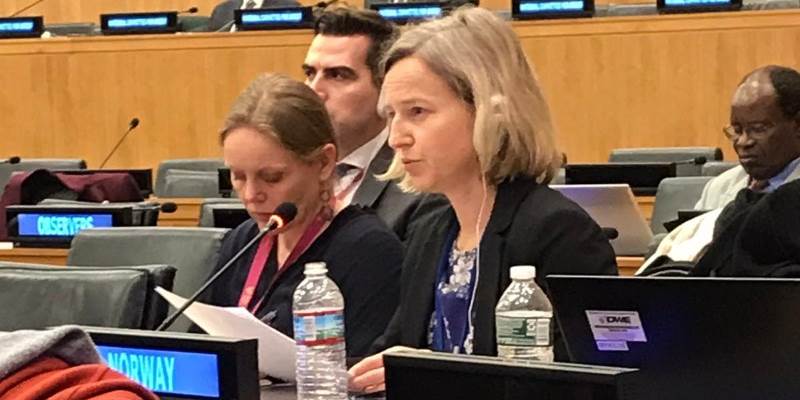Thank you Mr. President,
I deliver this statement on behalf of Australia, Austria, Belgium, Canada, Denmark, Finland, France, Germany, Israel, Italy, Japan, Lithuania, Moldova, New Zealand, Sweden, Switzerland Turkey, the United Kingdom, the United States and my own country Norway.
First, we would like to highlight the importance of the Board of Auditors as “the third line of defense”, whose role and work is critical for ensuring transparency and trust between the agencies and their respective executive boards.
We would also like to thank the presenters of UNICEFs financial report and audited statements for 2018 and the Report of the Board of Auditors. We commend UNICEF for once again having received an unqualified audit and for providing a comprehensive management response to the report. We also note the progress in implementing current and previous recommendations of the auditors.
Last year the Board encouraged UNICEF to strengthen efforts to tackle areas of recurring audit recommendations and to effectively address the root causes of the problems highlighted by the Board of Auditors. We cannot see that this has been done or that it is reflected upon in the management response.
We urge UNICEF to prioritize follow up of recommendations based on an assessment of which weaknesses pose the greatest risks to results achievement, and to reduce these risks by addressing the root causes.
Follow up of partners and of national committees are areas subject to recurring audit observations and pose significant risks to results achievement.
We welcome the positive steps that have been taken to strengthen HACT-training of staff and regular monitoring of compliance with HACT. However, sustained efforts are still needed at country-level as offices do not always comply with the procedures, and the quality of assurance activities is not always sufficient. We urge UNICEF to make efforts across the organization and its offices to ensure full HACT compliance. Future management responses should provide evidence of improvements over time both in terms of compliance and of quality of applied HACT procedures.
The BoA report points to significant shortfalls in private sector fundraising. We would welcome more analysis of why national committees and country offices have not met private sector revenue targets. On the basis of this analysis, UNICEF and particularly PFP, should ensure an effective follow-up process, taking into account the different country contexts and fundraising markets. For offices with persistent underperformance against past targets we would recommend setting more realistic targets or even ceasing fundraising activities if they are not cost-effective
Considering the size of UNICEF, the number of partners and the many challenging areas it operates in, we are concerned that the low numbers of reported fraud reflect weaknesses in the detection of financial mismanagement – rather than an actual decrease in mismanagement.
We therefore highly welcome recent measures to prevent and detect fraud. In addition to these measures, we encourage UNICEF to explore the use of proactive investigations with special expertise to uncover fraud by third parties. This may lead to a higher number of cases being detected and could have a preventive effect.
On an issue not strictly related to the financial audit but of significance to UNICEF’s systems and operations, we would like to acknowledge the ongoing efforts in the UN to reduce the organisation’s negative impact on the climate and the environment. We encourage UNICEF to report to the board on the main measures the organization is implementing in order to achieve this aim, either in the context of internal auditing or as a separate agenda item at the annual meeting.
Thank you.
